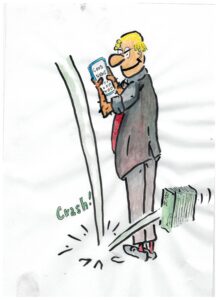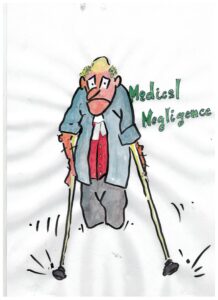Mathematical Algorithms
- 2021-09-03
- By Dr Will Higgs PhD, Barrister
- Posted in Algorithms, Artificial Intelligence, featured
A mathematical algorithm is a procedure for solving a given mathematical problem, commonly applied in the field of computer software related inventions.
In Grant v Commissioner of Patents [2006] FCAFC 120, the Full Court stated:
“It has long been accepted that ‘intellectual information’, a mathematical algorithm, mere working directions and a scheme without effect are not patentable.”
However, while a mathematical algorithm per se may not be a manner of manufacture, the presence of such an algorithm within the steps in an otherwise patentable method does not exclude a claim from patentability. For example, in Re International Business Machines Corporation v Commissioner of Patents [1991] FCA 625 the Court, in considering a method for producing an improved (i.e. smoother) visual representation of a curve, found (at [16]) that:
“In the present case, it seems to me that the use of the algorithm is not different conceptually from the use of the compounds involved in National Research and Development Council. Just as those compounds were previously known, so here, it is not suggested there is anything new about the mathematics of the invention. What is new is the application of the selected mathematical methods to computers, and in particular, to the production of the desired curve by computer. This is said to involve steps which are foreign to the normal use of computers ….”
The distinction to be drawn is between a claim to an algorithm (or scientific principle or natural phenomenon) in the abstract sense and the application of the formula to a process such that it produces
some advantage which is material, in the sense that the process belongs to a useful art as distinct from a fine art.
Examples of inventions involving mathematical algorithms that would be patentable are:
- any otherwise-patentable process which uses a specific algorithm or mathematical formula, e.g. a claim to a method of annealing a tungsten alloy where: the heating time (seconds) = 6.78 mass of ingot/temperature (C).
- a method that generates a more accurate measurement/calculation of an amount of oil in an underground deposit using a mathematical algorithm to process measured input data. Here the invention can be classified as technical or practical.
Examples of inventions involving a mathematical algorithm that would not be patentable are:
- a method that uses an algorithm to calculate data indicative of success of aspects of commerce such as investments. Here the invention is akin to business innovation as opposed to technical innovation, being in an abstract art of organising or analysing human activity.
- a pure mathematical formula (unapplied), e.g. a claim to a method of calculating a value c, where:
c = ex sin (t)
SEARCH BLOG POSTS
LATEST BLOG POSTS
- Updated product safety mandatory reporting guidance for suppliers now available
- Pleading fraud – cause and effect is essential
- Does the Trustee’s right of indemnity have priority over the right of beneficiaries in relation to assets?
- Rules of war (in a nutshell) | The Laws Of War
- MH370 Final Report
Past Blog Posts
- December 2021
- September 2021
- August 2021
- May 2021
- April 2021
- March 2021
- August 2020
- February 2020
- September 2019
- February 2019
- December 2018
- July 2018
- April 2018
- December 2017
- May 2017
- February 2017
- December 2016
- November 2016
- October 2016
- September 2016
- August 2016
- April 2016
- March 2016
- October 2015
- September 2015
- August 2015
- May 2014
- April 2014
- March 2014
- January 2014
Categories
- Appeals
- Artificial Intelligence
- Aviation law
- Banking and Finance Law
- Blogs
- Civil Liability Act
- Class Actions
- Coding for lawyers
- common law
- Consumer Claims (TPA)
- Contract Law
- Contractual Interpretation
- Criminal law
- Deeds
- Docassemble
- duty of care
- Engineering Law
- Equity
- Evidence
- Exclusion Clauses
- Execution of documents
- Expert Witness
- featured
- Financial Services
- Fraud
- Fundraising (Chapter 6D)
- General comment
- Home Building Law
- Insurance
- Legal drafting
- Local Court
- Medical Negligence
- MH370
- Motor Accidents
- Negligence
- Occupiers negligence
- Other
- Personal Injury
- Personal Property Securities (PPSA)
- Pleading
- Practice & Procedure
- Products Liability
- Property
- Real Property
- Reasons for a decision
- Securitisation
- Security (Mortgages & Charges)
- Sentencing
- Swaps & Derivatives
- Teaching
- Transactional Law
- Transfer of financial assets in transactions
- Trusts & Trustee Law
- Uncategorized
- War and Weaponry
- Witnesses
SEARCH BLOG POSTS
LATEST BLOG POSTS
- Updated product safety mandatory reporting guidance for suppliers now available
- Pleading fraud – cause and effect is essential
- Does the Trustee’s right of indemnity have priority over the right of beneficiaries in relation to assets?
- Rules of war (in a nutshell) | The Laws Of War
- MH370 Final Report
Past Blog Posts
- December 2021
- September 2021
- August 2021
- May 2021
- April 2021
- March 2021
- August 2020
- February 2020
- September 2019
- February 2019
- December 2018
- July 2018
- April 2018
- December 2017
- May 2017
- February 2017
- December 2016
- November 2016
- October 2016
- September 2016
- August 2016
- April 2016
- March 2016
- October 2015
- September 2015
- August 2015
- May 2014
- April 2014
- March 2014
- January 2014
Categories
- Appeals
- Artificial Intelligence
- Aviation law
- Banking and Finance Law
- Blogs
- Civil Liability Act
- Class Actions
- Coding for lawyers
- common law
- Consumer Claims (TPA)
- Contract Law
- Contractual Interpretation
- Criminal law
- Deeds
- Docassemble
- duty of care
- Engineering Law
- Equity
- Evidence
- Exclusion Clauses
- Execution of documents
- Expert Witness
- featured
- Financial Services
- Fraud
- Fundraising (Chapter 6D)
- General comment
- Home Building Law
- Insurance
- Legal drafting
- Local Court
- Medical Negligence
- MH370
- Motor Accidents
- Negligence
- Occupiers negligence
- Other
- Personal Injury
- Personal Property Securities (PPSA)
- Pleading
- Practice & Procedure
- Products Liability
- Property
- Real Property
- Reasons for a decision
- Securitisation
- Security (Mortgages & Charges)
- Sentencing
- Swaps & Derivatives
- Teaching
- Transactional Law
- Transfer of financial assets in transactions
- Trusts & Trustee Law
- Uncategorized
- War and Weaponry
- Witnesses




